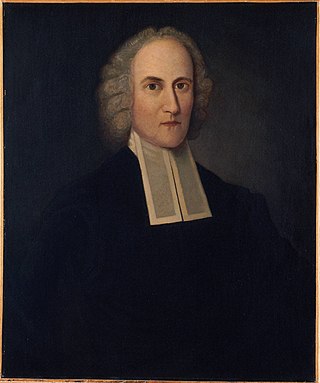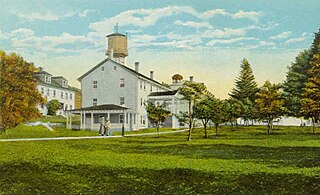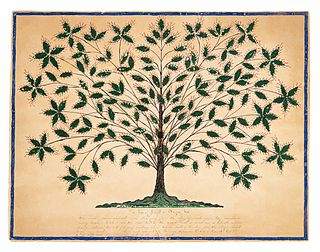Related Research Articles

The Second Great Awakening was a Protestant religious revival during the early 19th century in the United States. It spread religion through revivals and emotional preaching and sparked a number of reform movements. Revivals were a key part of the movement and attracted hundreds of converts to new Protestant denominations. The Methodist Church used circuit riders to reach people in frontier locations.

The United Society of Believers in Christ's Second Appearing, more commonly known as the Shakers, are a millenarian restorationist Christian sect founded c. 1747 in England and then organized in the United States in the 1780s. They were initially known as "Shaking Quakers" because of their ecstatic behavior during worship services. Espousing egalitarian ideals, women took on spiritual leadership roles alongside men, including founding leaders such as Jane Wardley, Ann Lee, and Lucy Wright. The Shakers emigrated from England and settled in Revolutionary colonial America, with an initial settlement at Watervliet, New York, in 1774. They practice a celibate and communal utopian lifestyle, pacifism, uniform charismatic worship, and their model of equality of the sexes, which they institutionalized in their society in the 1780s. They are also known for their simple living, architecture, technological innovation, music, and furniture.

Jonathan Edwards was an American revivalist preacher, philosopher, and Congregationalist theologian.
Millenarianism or millenarism is the belief by a religious, social, or political group or movement in a coming fundamental transformation of society, after which "all things will be changed". Millenarianism exists in various cultures and religions worldwide, with various interpretations of what constitutes a transformation.

Philip Schaff was a Swiss-born, German-educated Protestant theologian and ecclesiastical historian, who spent most of his adult life living and teaching in the United States.
The Third Great Awakening refers to a historical period proposed by William G. McLoughlin that was marked by religious activism in American history and spans the late 1850s to the early 20th century. It influenced pietistic Protestant denominations and had a strong element of social activism. It gathered strength from the postmillennial belief that the Second Coming of Christ would occur after mankind had reformed the entire Earth. It was affiliated with the Social Gospel movement, which applied Christianity to social issues and gained its force from the awakening, as did the worldwide missionary movement. New groupings emerged, such as the Holiness movement and Nazarene and Pentecostal movements, and also Jehovah's Witnesses, Spiritualism, Theosophy, Thelema, and Christian Science. The era saw the adoption of a number of moral causes, such as the abolition of slavery and prohibition.

Pleasant Hill, Kentucky, USA, is the site of a Shaker religious community that was active from 1805 to 1910. Following a preservationist effort that began in 1961, the site, now a National Historic Landmark, has become a popular tourist destination. Shaker Village of Pleasant Hill, or Shakertown, as it is known by residents of the area, is located 25 miles (40 km) southwest of Lexington, in Kentucky's Bluegrass region. It is a National Historic Landmark District.

Jonathan Zittell Smith, also known as J. Z. Smith, was an American historian of religions. He was based at the University of Chicago for most of his career. His research included work on such diverse topics as Christian origins, the theory of ritual, Hellenistic religions, Māori cults in the 19th century, and the mass suicide in Jonestown, Guyana, as well as methodological studies on such common scholarly tools as description, comparison, and interpretation. An essayist, his works include Map Is Not Territory, Imagining Religion: From Babylon to Jonestown,To Take Place: Toward Theory in Ritual,Drudgery Divine: On the Comparison of Early Christianities and the Religions of Late Antiquity,Relating Religion: Essays in the Study of Religion, and a collection of his writings on pedagogy, On Teaching Religion.
Wittenberg Concord, is a religious concordat signed by Reformed and Lutheran theologians and churchmen on 29 May 1536 as an attempted resolution of their differences with respect to the Real Presence of Christ's body and blood in the Eucharist. It is considered a foundational document for Lutheranism but was later rejected by the Reformed.

Canterbury Shaker Village is a historic site and museum in Canterbury, New Hampshire, United States. It was one of a number of Shaker communities founded in the 19th century.
Robert G. Clouse was an American religious academic who was professor at Indiana State University, Terre Haute, Indiana.
The American Society of Church History (ASCH) was founded in 1888 with the disciplines of Christian denominational and ecclesiastical history as its focus. Today the society's interests include the broad range of the critical scholarly perspectives, as applied to the history of Christianity and its relationship to surrounding cultures in all periods, locations, and contexts. The society was founded by Philip Schaff.

Lucy Wright was the leader of the United Society of Believers in Christ’s Second Appearing, also known as the Shakers, from 1796 until 1821. At that time, a woman's leadership of a religious sect was a radical departure from Protestant Christianity.
Religious communism is a form of communism that incorporates religious principles. Scholars have used the term to describe a variety of social or religious movements throughout history that have favored the common ownership of property.
Catherine Anne Brekus is Charles Warren Professor of the History of Religion in America at Harvard Divinity School. Brekus' work is centered on American religious history, especially the religious history of women, focusing on the evangelical Protestant tradition.

Edward Deming Andrews was an American historian, educator, curator, and preeminent authority on the United Society of Believers in Christ's Second Appearing, or the Shakers.
Judith Weisenfeld is an American scholar of religion. She is Agate Brown and George L. Collord Professor of Religion at Princeton University, where she is also the Chair of the Department of Religion. Her research primarily focuses on African-American religion in the first half of the 20th century. In 2019, Weisenfeld was elected to the American Academy of Arts and Sciences.
Church music during the Reformation developed during the Protestant Reformation in two schools of thought, the regulative and normative principles of worship, based on reformers John Calvin and Martin Luther. They derived their concepts in response to the Catholic church music, which they found distracting and too ornate. Both principles also pursued use of the native tongue, either alongside or in place of liturgical Latin.
James Walter Fraser is an American educationalist, pastor, and academic administrator. He is a professor of history and education and chair of the applied statistics, social science, and humanities department at the Steinhardt School of Culture, Education, and Human Development. Fraser is dean of education at the University of the People. He is a past president of the History of Education Society. Fraser was the pastor at Grace Church Federated from 1986 to 2006.
Mary Baker Eddy (1998) by Gillian Gill is a biography of Mary Baker Eddy, a religious leader and founder of the Church of Christ, Scientist.
References
- 1 2 3 "Stephen Joseph Stein Obituary". heraldtimesonline.com. The Herald Times. 26 January 2022.
- 1 2 3 4 5 6 7 "Stephen J. Stein papers, 1960-2005, bulk 1976-2005 - Archives Online at Indiana University". archives.iu.edu.
- 1 2 3 4 5 "Stephen J. Stein: University Honors and Awards". Indiana University.
- ↑ Gaustad, Edwin S. (1978). "Review of Apocalyptic Writings". The Journal of American History. 65 (1): 108–109. doi:10.2307/1888145. ISSN 0021-8723.
- ↑ Critical essays on Jonathan Edwards. Boston: G. K. Hall. 1980. ISBN 978-0-8161-8304-3.
- ↑ The Apocalypse in English Renaissance thought and literature : patterns, antecedents, and repercussions. Manchester: Manchester University Press. 1984. ISBN 978-0-7190-0958-7.
- ↑ Perspectives on American religion and culture. Malden, Mass.: Blackwell. 1999. ISBN 978-1-57718-117-0.
- ↑ Pietism in Germany and North America 1680-1820. Farnham, England; Burlington, VT: Ashgate. 2009. ISBN 978-0-7546-6401-7.
- ↑ The Columbia guide to religion in American history. New York: Columbia University Press. 2012. ISBN 978-0-231-14020-1.
- ↑ Marini, Stephen A. (1994). "Demythologizing Shakerism". Reviews in American History. 22 (2): 242–247. doi:10.2307/2702890. ISSN 0048-7511.
- ↑ "Back Matter". Church History. 63 (2). 1994. ISSN 0009-6407.
- ↑ Bainbridge, William Sims (1993). "Review of The Shaker Experience in America: A History of the United Society of Believers". Journal for the Scientific Study of Religion. 32 (3): 298–299. doi:10.2307/1386671. ISSN 0021-8294.
- ↑ "Review: 'The Shaker Experience in America: A History of the United Society of Believers'". Kirkus Reviews . 1992-04-15.
- ↑ Westerkamp, Marilyn J. (1994). "Review of The Shaker Experience in America: A History of the United Society of Believers". Winterthur Portfolio. 29 (1): 91–94. ISSN 0084-0416.
- ↑ "Front Matter". Church History. 63 (1). 1994. ISSN 0009-6407.
- ↑ Stein, Stephen J. (1995). "America's Bibles: Canon, Commentary, and Community". Church History. 64 (2): 169–184. doi:10.2307/3167903. JSTOR 3167903.
- ↑ "Front Matter". Journal of the American Academy of Religion. 54 (2): 254–367. 1986. ISSN 0002-7189.
- ↑ "2014 News and Updates". www.josephsmithpapers.org. Retrieved 1 September 2023.
- ↑ "Project Organization". The Joseph Smith Papers. Retrieved 2009-02-21.
- ↑ Mastromarino, Mark A. (1 January 2015). "Rough Stone Rising: The Joseph Smith Papers Project". Mormon Studies Review. 2 (1): 4.
- ↑ "Stephen J. Stein". Department of Religious Studies. IU.